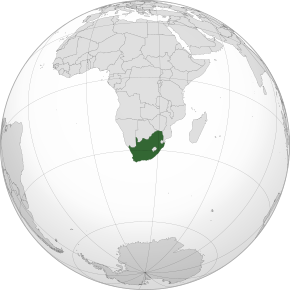More languages
More actions
| Republic of South Africa | |
|---|---|
 | |
| Largest city | Johannesburg |
| Official languages | Afrikaans English Ndebele Sepedi Sesotho Setswana Swazi Tshivenda Xhosa Xitsonga Zulu |
| Dominant mode of production | Capitalism |
| Area | |
• Total | 1,221,037 km² |
| Population | |
• 2021 estimate | 60,142,978 |
South Africa, officially the Republic of South Africa, is the southernmost country in Africa. It shares borders with Zimbabwe, Botswana, Namibia, Lesotho, Eswatini, and Mozambique.
History[edit | edit source]
British colonization[edit | edit source]
The British Empire defeated the Boer settlers but let them create their own state and racially segregate Africans.[1] African dockworkers first struck in 1874.[2] At the 1885 Berlin Conference, European powers divided and colonized Africa, and the British took control of what is now South Africa.[3] They fought against the Boers again from 1899 to 1902.[4] Africans rebelled again in 1906 under the leadership of Bambatha kaMancinza following a poll tax.[3] In 1910, the UK united various Boer settlements and British colonies into a single state.[4]
Apartheid era[edit | edit source]
The Afrikaner Nationalist Party took power in 1948 and had direct connections to German fascism.[4]
During the apartheid era, many Black Africans were confined to puppet states called Bantustans that were nominally independent. Bantustans made up 13% of the country's area and were on poor land far from urban areas. Africans who left the Bantustans without identification documents could be arrested and deported to the nearest Bantustan.[5]
In 1960, white supremacist forces killed members of the Pan-Africanist Congress who were protesting against apartheid in the Sharpeville massacre. Dockworkers in Durban struck in 1969 and again in 1972. Inkatha, a reactionary Zulu nationalist organization, opposed the strikes.[2]
The CIA suppressed the anti-apartheid movement from the 1960s to 1980s and provided information about ANC members and activities. In 1981, they sent the South African military into Mozambique to assassinate ANC members in exile. The CIA was responsible for the arrest of Nelson Mandela and violated a UN policy by sending weapons to South Africa.[6]
In the 1980s, the United States provided hundreds of thousands of dollars to South African media to promote Western bourgeois ideals and counter Marxism.[7]
Post-apartheid[edit | edit source]
In the 2024 election, the alliance of the ANC, SACP, and the Congress of South African Trade Unions won a combined 40.18% compared to 59.50% in 2019. The MK and EFF parties, which previously broke away from the ANC, won 64.28%.[8]
Current racial inequality[edit | edit source]
White settlers own over 70% of South Africa's farmland despite only being 8% of the population,[9] whereas Africans only own 4% of the farmland.[10] The average income for settlers is five times higher than for Black Africans.[5]
References[edit | edit source]
- ↑ Domenico Losurdo (2011). Liberalism: A Counter-History: 'The West and the Barbarians' (pp. 221–222). [PDF] Verso. ISBN 9781844676934 [LG]
- ↑ 2.0 2.1 "The 1973 Durban Strikes: Building Popular Democratic Power in South Africa" (2023-01-24). Tricontinental. Archived from the original on 2023-01-24. Retrieved 2023-02-10.
- ↑ 3.0 3.1 "South Africa and the continental struggle for socialism" (2014-01-26). Liberation News. Archived from the original on 2019-07-14. Retrieved 2022-07-02.
- ↑ 4.0 4.1 4.2 Josie Mpama (2023-03-31). "Josie Mpama" Tricontinental. Archived from the original on 2023-04-12. Retrieved 2023-04-16.
- ↑ 5.0 5.1 Lewis Barnes (2018-05-05). "South Africa: Major developments in the long struggle for land reform" Liberation News. Archived from the original on 2019-07-14. Retrieved 2022-07-02.
- ↑ William Blum (2002). Rogue State: A Guide to the World's Only Superpower: 'A Concise History of United States Global Interventions, 1945 to the Present' (pp. 122–123). [PDF] Zed Books Ltd. ISBN 9781842772201 [LG]
- ↑ Ajit Singh, Roscoe Palm (2022-08-08). "Manufacturing consent: How the United States has penetrated South African media" Monthly Review. Archived from the original on 2022-08-08. Retrieved 2022-08-09.
- ↑ Vijay Prashad (2024-06-13). "Democracy Will Not Come through Compromise and Fear: The Twenty-Fourth Newsletter (2024)" The Tricontinental. Archived from the original on 2024-06-13.
- ↑ Francis Njubi Nesbitt (2018-08-27). "In South Africa, Trump Embraces a Global Neo-Nazi Myth" MintPress News. Retrieved 2022-07-02.
- ↑ "This Land Is the Land of Our Ancestors" (2022-06-22). Tricontinental. Archived from the original on 2022-09-05. Retrieved 2022-11-12.


